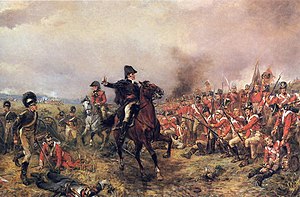

Arthur Wellesley, 1st Duke of Wellington, KG, GCB, GCH, PC, FRS (1 May 1769 – 14 September 1852), was one of the leading British military and political figures of the 19th century. Often referred to solely as "The Duke of Wellington", he led a successful military career in the Indian subcontinent during the Fourth Anglo-Mysore War (1798–99) and the Second Anglo-Maratha War (1803–1805), and in Europe during the Napoleonic Wars (1803–1815).
Starting his career in 1787 as a commissioned officer in the infantry, before seeing his first action in the Flanders campaign, Wellesley rose in rank by purchasing his first four commissions, as was common practice in the British Army for wealthy officers.[1] His continued rise in status and fame thereafter came about as the result of his tactical ability and successes as an army commander.
Between 1794 and 1815, Wellesley participated in a number of military campaigns where he achieved tactical, strategic, and decisive victories in India and across Europe.[2]
Wellesley faced and defeated many of Napoleon's marshals as the commander in chief of the Anglo-Portuguese Army during the Peninsular War, but his best known battle was at Waterloo in 1815 where he led an Anglo-Allied force to a decisive victory over Napoleon. It was to be the last battle for both commanders, and brought the Napoleonic Wars to a close.
© MMXXIII Rich X Search. We shall prevail. All rights reserved. Rich X Search
